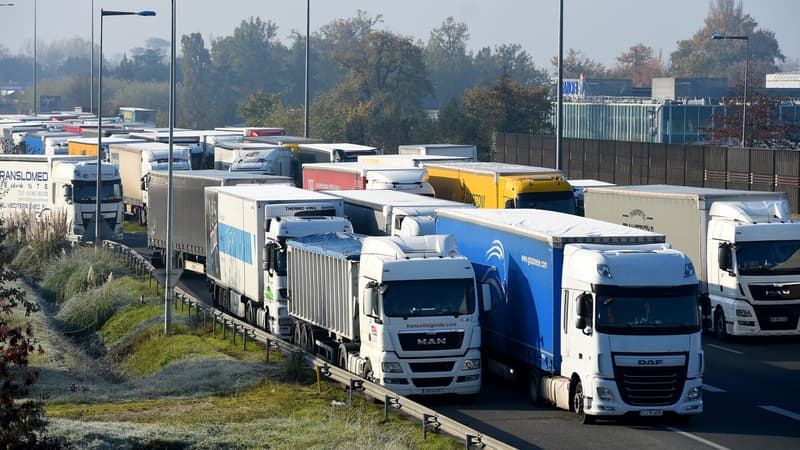After the Twenty-Seven, MEPs will vote this week to reduce carbon emissions from heavy vehicles and generalize “zero emissions” buses, a logistical and industrial challenge that worries manufacturers. The issue is crucial for European climate goals: trucks, buses and coaches generate more than 6% of the EU’s greenhouse gas emissions, a quarter of road transport emissions.
In February, the European Commission announced its proposals to address it, the same day that MEPs approved the end of sales of new cars with thermal engines in 2035. According to the Brussels legislative project, emissions from heavy vehicles sold from 2030 should be reduced by at least 45% compared to 2019, then reduced by 65% in 2035 and 90% in 2040. In mid-October, European Environment Ministers returned to these objectives.
Meeting in Strasbourg, MEPs will in turn adopt their position on Tuesday, before negotiations with the States. A compromise reached in the parliamentary committee sets a more ambitious goal for 2035 (70% reduction in emissions). For heavy vehicles, which run on diesel or gasoline, the switch to electricity or hydrogen (fuel cells or modified combustion engines) seems inevitable.
Hydrogen cells
The German Daimler group and the Swedish Volvo group will mass produce hydrogen fuel cells for trucks from 2025. And the world’s number one truck manufacturer, Mercedes-Benz Trucks, recently presented its first long-distance electric truck model . This is an “industrial revolution”, coupled with a “formidable challenge” represented by the production of electricity or green hydrogen to power this carbon-free fleet, Brussels recognizes.
The Association of European Automobile Manufacturers (ACEA) is alarmed by “unrealizable ambitions” without sufficient infrastructure and strong purchasing incentives. According to her, the target for 2030 would represent more than 400,000 zero-emission trucks on the roads, which would require some 700 hydrogen recharging stations and 50,000 suitable public electric charging points, infrastructure of which is almost completely lacking.
“Decarbonization is not a solitary task. Customers must have confidence” to purchase these vehicles, emphasizes Sigrid de Vries, general director of ACEA. MEPs should also reduce the list of exemptions set by the States: the compromise reached between the parliamentary groups plans to extend the text to small and medium-sized trucks.
Chinese and American rivals
If police, fire, ambulance, agricultural or forestry vehicles were exempt, the rules would apply to some professional vehicles (garbage trucks, concrete mixers, etc.) that are easy to decarbonize. “It is about giving visibility to one of the main manufacturing industries, clearly promoting investments in electrification and hydrogen,” summarizes the rapporteur (Greens) of the text, Bas Eickhout.
“If they want to maintain their dominance in the EU, European truck manufacturers must accelerate their transition,” otherwise they risk learning the fate of automakers in the face of the emergence of American and Chinese rivals in the electrical sector, he warns. Sofie Defour, from the NGO Transport and Environment. For the “green” heavyweights, the Americans Tesla and Nikola or the Chinese BYD and Windrose are lurking, driven internally by huge subsidy plans from Washington and Beijing.
European manufacturers could lose up to 11% of their EU market share by 2035 to international competitors and currently non-existent imports, according to the BCG company, while “zero emissions” could already represent 2030 30% of the European market share. demand for trucks as prices fall.
7,000 new jobs
The legislation should boost the economy (7,000 net new jobs and 10 billion euros of additional GDP in 2035 according to BCG) “but the magnitude of the benefits will depend on the speed of the transition,” recalls Sofie Defour. Another objective: the Commission proposes that all new buses entering service in European cities from 2030 be “zero emissions”. The States want to extend the deadline until 2035, with an intermediate objective of 85% by 2030.
“Local authorities have just invested a lot in other transition technologies”, such as hybrid or biomethane buses, “they must be given time to adapt”, said the French Minister of Energy Transition, Agnès Pannier-Runacher, in mid-October. “We must also ensure that we have an adequate industrial offer at European level, it is a question of sovereignty,” she added.
Source: BFM TV


